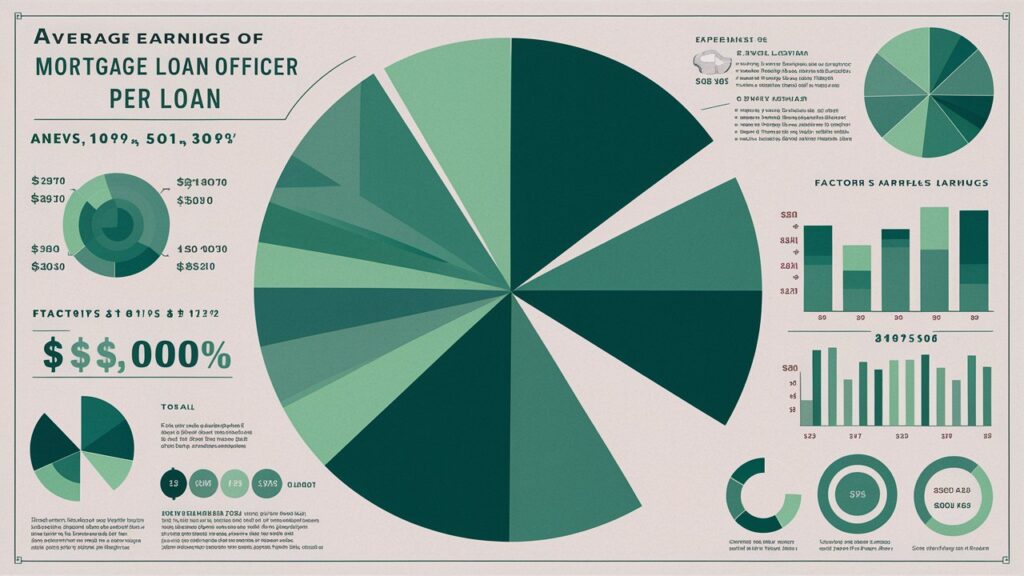A mortgage loan officer earns an average commission of $1,000 to $5,000 per loan. They are essential personnel in home buying and refinancing procedures.
Mortgage loan officers are responsible for guiding potential borrowers to informative financial choices and assisting them through the various processes involved. In addition, they handle the underwriting and document preparation processes and work with appraisers, title companies, and attorneys in loan processing.
But how much can a mortgage loan officer make per loan? Well, the average commission rates range from $1,000 to $5,000 per loan, and some also receive bonuses that go above that. A mortgage loan officer’s total income depends on numerous factors, including experience, area of expertise, and the number of loans processed. Let’s dive deeper into the world of mortgage loan officers and explore their incomes more.
The Different Types Of Mortgage Loan Officers
Mortgage loan officers play a significant role in the home-buying process and get paid on a commission basis based on each loan they originate. There are three main types of loan officers: retail loan officers, commercial loan officers, and mortgage brokers.
Retail Loan Officers
Retail loan officers work directly with clients and help them obtain residential home loans from a financial institution. They require licenses and may earn a commission on each loan closed.
Commercial Loan Officers
Commercial loan officers work with businesses to provide loans to finance purchases or expansion projects. They require experience and deep knowledge of financing. They may earn a higher commission and can be found in commercial banks and other organizations that work with business clients.
Mortgage Broker
Mortgage brokers work as intermediaries between the borrowers and lenders or banks. They work on a commission and may charge additional fees to clients. Mortgage brokers can provide various mortgage options to clients.
Factors That Affect Mortgage Loan Officer Salaries
Several factors affect the salary of a mortgage loan officer. One of the major factors is the geographic location. Loan officers working in high-cost areas can earn a higher salary compared to those in low-cost areas. Another important factor is the level of education and experience. A loan officer with advanced degrees and years of experience can negotiate for higher pay. Moreover, the commission structure is also crucial in determining the salary of a mortgage loan officer. A commission-based pay structure can result in a higher salary if the loan officer can close more deals.
| Factors | Description |
| Geographic Location | Loan officers working in high-cost areas can earn higher salary compared to those in low-cost areas |
| Level of Education and Experience | Loan officers with advanced degrees and years of experience can negotiate for higher pay. |
| Commission Structure | A commission-based pay structure can result in a higher salary if the loan officer can close more deals. |
Overview Of The Commission Structure For Mortgage Loan Officers
Mortgage loan officers have the potential to earn significant income through commission-based salaries. The commission rates, which vary by the lender, are structured based on the loan type and borrower’s characteristics, offering a dynamic earning potential.
The most common type of commission structure is the flat fee. Lenders pay loan officers a predetermined amount for each loan they close. Another standard commission is calculated as a percentage of the total loan amount. Finally, some lenders offer tiered commission structures based on the number of loans a loan officer closes per month or year.
Flat fees can range from a few hundred to a few thousand dollars per loan. Percentage-based commissions generally fall between 1% and 2% of the loan amount, with higher percentage points awarded for larger or more complex loans. Some lenders offer tiered structures with bonuses for high performers. Regardless of the structure, the loan officers’ commission is paid once the borrower has closed the loan.
| Commission Type | Average Commission Range |
| Flat Fees | $500-$2,000 per loan |
| Percentage of Total Loan Amount | 1%-2% of total loan amount |
| Tiered Commission Structures | Bonuses for high performers |
What Are The Pros Of Working As A Mortgage Loan Officer?

Mortgage loan officers can earn a significant income from each loan they process. Income varies based on the loan amount, the number of loans processed, and commission rates. The average pay for a mortgage loan officer ranges from $75,000 to $150,000 per year, making it a lucrative and rewarding career path.
The potential for high income is one of the main benefits of working as a mortgage loan officer. Loan officers typically earn a commission based on the size of the loan that they process. The more loans they process, the higher their income potential. Moreover, working as a loan officer offers flexibility in the work schedule. Loan officers can often work from home or set their schedule. Lastly, there are opportunities for advancement. Top-performing loan officers have the potential to move up the ranks to become managers or even executives in a financial institution.
Mortgage loan officers need a combination of technical and customer service skills to be successful in this industry. They should also have a strong understanding of the lending process and knowledge of different loan products available to clients. If you have these skills, you can earn a good salary while helping people achieve their dream of homeownership.
What Are The Cons Of Working As A Mortgage Loan Officer?
Mortgage loan officers make money per loan, but the job comes with some downsides. This includes a lack of work-life balance, dealing with customers who may need help understanding the process, and facing quotas set by lenders.
Cons Of Working As A Mortgage Loan Officer
Working as a mortgage loan officer can be challenging. The job requires a lot of hard work and dedication. Here are some of the cons of working as a mortgage loan officer:
| Job Volatility: | Loan officers’ employment is known to be sensitive to economic conditions. If the housing market is weak, loan demand can drop, leading to layoffs for loan officers. As a result, job security is not guaranteed. |
| Heavy Workload: | Loan officers must have excellent communication, organizational, and multitasking abilities to keep up with the heavy workload. They must work even during weekends and outside work hours to meet their clients’ demands. |
| Strict Regulatory Requirements: | Mortgage loan officers are subject to a variety of regulations that govern how they conduct business. MINI/SAFE Act requires loan officers to obtain a license and maintain their qualifications up to date. Failure to meet these standards can lead to disciplinary actions or loss of license. |
In summary, although the work of a mortgage loan officer can be rewarding, the job also comes with its set of challenges. Prospective loan officers must weigh the pros and cons before deciding whether to join this profession.
How To Become A Mortgage Loan Officer?
In order to become a mortgage loan officer, you need to have a certain level of education, training, and licensing. Here are the key steps:
| Education and Licenses | On-the-Job Training | Finding Job Openings |
| You must have a bachelor’s degree, preferably in finance or business. | On-the-job training is usually provided by employers. You can gain experience by working under an experienced loan officer. | You can look for job openings at various financial institutions, such as banks, credit unions, or mortgage companies. |
| You must also obtain a mortgage loan originator license, which involves taking pre-licensing courses and passing an exam. You may also need to obtain additional licenses depending on the state you work in. | On-the-job training can last several months to a year, based on the complexity of loans. | You can also search for job openings on job boards or through industry associations. |
Once you have completed these steps, you’ll be ready to pursue a career as a mortgage loan officer and start helping people finance their dream homes.
Tips For Maximizing Income As A Mortgage Loan Officer
Mortgage loan officers play a crucial role in the home-buying process. While the pay structure varies between different companies and regions, there are ways to ensure you are maximizing your income.
One of the most important factors is focusing on customer service. By building a reputation for providing excellent service and meeting the unique needs of each client, you can cultivate a loyal customer base and generate repeat business. Additionally, networking and attending industry events can help you expand your client base and further establish your credibility in the industry.
Another strategy is to diversify revenue streams. This can include offering additional services or products, such as credit counseling or insurance. By providing these services, you can earn extra commissions and increase your overall income.
With dedication and a focus on customer satisfaction, networking, and diversifying revenue streams, mortgage loan officers can increase their earning potential and build a successful career in the industry.
How To Determine If Working As A Mortgage Loan Officer Is Right For You

If you’re interested in becoming a mortgage loan officer, it’s important to consider both the pros and cons of this career path. The following are some factors to take into account:
Assess Your Skills and Personality Traits: A successful mortgage loan officer should have strong communication skills, attention to detail, and the ability to work under pressure. Additionally, they should be organized and have good time-management skills.
Research the Industry: It’s essential to understand the current state of the mortgage industry and the various types of loans and lending programs available to borrowers. Stay updated on trends and changes in the industry to best serve your clients.
In conclusion, working as a mortgage loan officer can be a rewarding career for those with the right skills and personality traits. However, it’s important to do your research and ensure that this career path is a good fit for you.
Top Mortgage Loan Officer Jobs
Mortgage loan officers can make a commission on each loan, typically earning 1% of the loan amount. The top-paying loan officer jobs can earn a six-figure salary, but it also depends on factors such as location and experience.
| Mortgage Loan Officer Jobs | ||
| Quicken Loans | Wells Fargo | J.G. Wentworth Home Lending |
| Average Pay per Loan: $723 | Average Pay per Loan: $782 | Average Pay per Loan: $801 |
| Number of Loans per Month: 6 | Number of Loans per Month: 5 | Number of Loans per Month: 4 |
Mortgage Loan Officers play a critical role in the home-buying process, acting as the intermediary between a borrower and a lender. While their primary focus is helping clients secure loans to purchase homes, they’re also responsible for analyzing various financial factors to determine the best loan option for their clients. Three top Mortgage Loan Officer Jobs are Quicken Loans, Wells Fargo, and J.G. Wentworth Home Lending. Quicken Loans, with an average pay per loan of $723, can help clients originate the loan while walking them through the mortgage process and answering their questions. Wells Fargo, with an average pay per loan of $782, can help clients find the right loan, analyze their options, and help with underwriting. J.G. Wentworth Home Lending, with an average pay per loan of $801, can offer customized solutions to help clients get the loan that’s right for their unique financial situation.
Frequently Asked Questions
Why Do Mortgage Loan Officers Make So Much Money?
Mortgage loan officers make good money due to commission-based earnings. The more loans they close, the higher the commission. Additionally, some officers work with high-end clients, which can bring in bigger business and bigger earnings. Their job is demanding, highly regulated, and requires a specific skill set, making their skills and time valuable.
What Is The Most Money A Loan Officer Can Make?
Loan officers’ earning potential can vary based on several factors, such as experience, location, and employer. However, according to the Bureau of Labor Statistics, the highest 10% of loan officers made more than $132,160 in 2019.
How Much Do Loan Originators Make In Texas?
The salary of a loan originator in Texas depends on experience, qualifications, and the employer. However, according to Glassdoor, the average base pay is around $45,000 to $70,000 annually. Commission or performance bonuses may also apply.
How Long Does It Take To Become A Loan Officer In Texas?
It typically takes about 1-3 months to become a loan officer in Texas. The process involves completing pre-licensing education courses, passing a national exam, obtaining state licensing, and getting hired by a financial institution. However, the exact timeline can vary based on individual circumstances and requirements.
How Much Commission Does A Mortgage Loan Officer Make On A Loan?
The commission rate for a mortgage loan officer is typically 1-2% of the loan amount.
Are There Any Additional Fees Associated With Mortgage Loans?
Yes, there may be additional fees, such as loan origination fees, appraisal fees, and title fees.
Conclusion
As we wrap up this discussion, it’s clear that mortgage loan officers can earn a decent income per loan. However, the specific amount varies greatly depending on factors such as experience, location, and the type of loan. To maximize their earning potential, loan officers must continuously upgrade their skills, market themselves effectively, and build strong relationships with clients.
Overall, the world of mortgage lending can be financially rewarding for those who work hard and stay motivated












